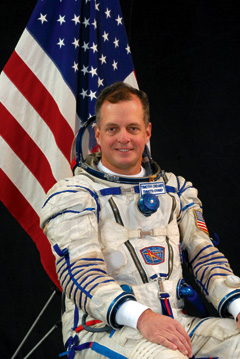The final frontier
Astronaut T.J. Creamer, ’82, embarks on international space station mission
Courtney Jolley, MBA ’10
Like a lot of kids his age, Timothy “T.J.” Creamer sat enthralled on July 20, 1969. As he watched astronaut Neil Armstrong take his historic moonwalk, he wondered whether he could do something like that one day...
Unlike most of his peers, Creamer has seen his childhood dream come true. In December, Creamer, a U.S. Army colonel and member of the Class of 1982, embarked on a six-month mission to the International Space Station.

A flight engineer and science officer, Creamer—a mission specialist with the National Aeronautics and Space Administration (NASA)—has been working with a fellow American astronaut, a Japanese astronaut, and two Russian cosmonauts on a wide range of projects at the station.
“On a daily basis, we’ve been doing necessary maintenance items like troubleshooting our water delivery system and fixing the toilet; conducting medical, plant, material science, and nutritional experiments; and engaging in daily exercise,” said Creamer in an email from the station, approximately 220 miles from Earth.
The crew also installed a new, larger window, called the cupola, on the station’s port side facing the Earth.
“I knew the views of the Earth would be great, but just how beautiful it is is simply outstanding,” Creamer said.
Creamer’s mission—his first spaceflight—represents the culmination of more than 10 years of dedicated training and preparation.
After earning a chemistry degree from Loyola and receiving his commission as a second lieutenant in the Army, Creamer spent seven years as an Army helicopter pilot. He later completed a master’s degree in physics at the Massachusetts Institute of Technology and went on to teach physics at the United States Military Academy at West Point.
Assigned to NASA as a vehicle integration test engineer in 1995, he was accepted into the astronaut program in 1998.
“Once you’re selected, you move through a lengthy maturation process before you’re ready for a spaceflight,” said Creamer. “There is just so much to master that’s specific to spacecraft systems.”